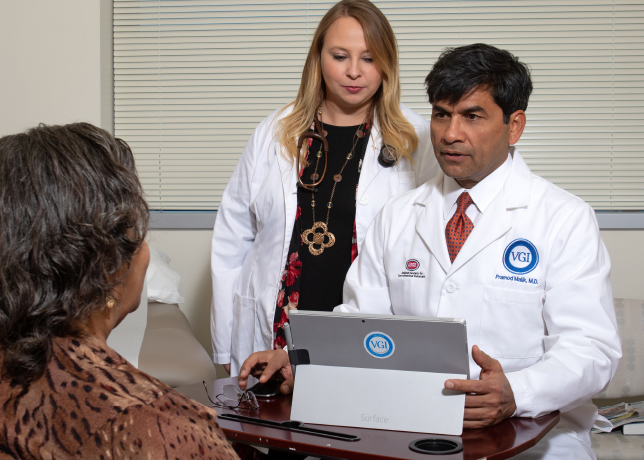President and Lead Physician, Virginia Gastroenterology Institute, Suffolk

Dr. Pramod Malik has never hesitated to think outside the box. He’s not afraid of taking risks that he and his patients decide on together, as a team.
In his years of training as a surgeon before he decided to go into gastroenterology, Dr. Malik developed unique insights and innovative approaches in his specialty that have allowed for remarkable recoveries in patients with highly complex situations.
Dr. Malik, who has practiced in Virginia since 2002 and is now the President of Virginia Gastroenterology Institute, likes to share stories of his memorable patients.
One of his most satisfying cases was that of an otherwise healthy man in his early 50s with complete obstruction of the esophagus from previous radiation for cancer. He could not swallow even his saliva and was fed with a tube in his stomach.
“He would have continued on like that forever,” Dr. Malik relates. “I believed we could reconnect the esophagus for him. I had never done this before, but I knew of a technique that had been reported. I consulted with that physician in Texas and shared the plan with the patient and his wife. We all took risks and I was able to reconnect his esophagus that was separated by about an inch. It changed his life.” Since then, Dr. Malik has helped several other patients with similar problems.
Another major success story involved a woman who had undergone a vertical banded gastroplasty in which the band had stenosed. For nearly a decade, she had vomited almost all solid foods, yet surgeons did not want to operate. Dr. Malik inserted a stent inside her banded stomach to expand it and break down tissue around the band, so it was no longer embedded in her stomach and he could remove it.
Like many of his peers, Dr. Malik embraces emerging technologies in his specialty, often participating in trials to test them.
One potential game-changer in Crohn’s disease, for example, is a new camera pill that may avoid the need for a colonoscopy for disease assessment. Flexible endorobotic systems now provide 3D views and access to areas of the body that couldn’t be reached before. Gene therapy and smarter drugs are revolutionizing treatments for diseases that have been quite challenging.
Minimally invasive procedures, stents and the creative use of trans-specialty techniques are standard in Dr. Malik’s practice. He works with experts in other specialties to offer combined techniques that help patients avoid more traumatic and expensive treatments. He has been an early adopter of therapeutic endoscopy to drain pancreatic fluid collections, as well as the use of clips, endoscopic mucosal resection, and trans-gastric ERCP in patients who have had a gastric bypass surgery.
Yet Dr. Malik is equally committed to the “old school” value of building strong bonds with patients via thorough, honest conversations about their diseases, concerns and treatment options. “We are partners in managing their health,” he notes. “This, to me, is how medicine should always be practiced – never compromising quality, compassion and integrity.”
Dr. Malik also is a team player who believes in “closed loop” communication with patients, staff and other physicians involved in care to minimize misunderstandings. “The medical field is too complex for one person to know all that is needed to know to provide comprehensive care,” he says. To this end, Malik teaches nurses and techs in the area during various courses, as well as encourages them to be active participators in the endoscopy suite.
Growing up in India, Dr. Malik decided early on to pursue a career as a physician. After his medical education and a general surgery residency at M.S. University of Baroda in India, he debated between choosing trauma or cardiothoracic surgery as he searched for a challenging specialty that required advanced skills and quick thinking in critical situations.
Once Dr. Malik and his wife had emigrated to the United States in 1992, he did a medicine residency at Christ Hospital in Chicago, where a gastroenterologist introduced him to GI medicine and endoscopy. “I immediately saw in this specialty the things that attracted me to surgery,” he recalls.
Dr. Malik went on to complete a fellowship in gastroenterology at the University of Illinois at Chicago. He spent three years at Sturgis Hospital in Michigan and joined a GI group based in Norfolk, Chesapeake and Virginia Beach in 2002, where he was a partner until 2014. In 2015, he moved to Suffolk to be closer to his home; he started in his practice in 2016.
Dr. Malik has won numerous awards as a physician and has served in leadership roles ranging from chairman of hospital committees to an eight-year term as a board member of the Virginia Gastroenterological Society, including two years as the society’s president.
A father of two, Dr. Malik is grateful that his specialty gives him a good work-life balance, which he also feels makes him a better physician. His daughter is a junior pre-med student at the University of Virginia, while his son is a senior at Norfolk Academy. In his free time, he enjoys community service, biking, hiking, and backpacking trips with his friends.
In life, as in medicine, Dr. Malik never wants to take a route just because it’s easy. “To help people most and contribute most to society, you must evolve and be positive,” he says. “You don’t want to abandon things that work well, but innovations in care require a curious mind and calculated risk taking.”

